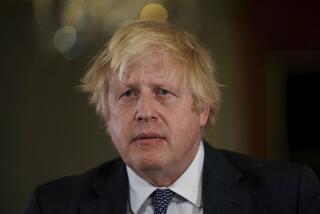Facing Up to Post-Thatcher Life in Britain : Government: Thatcher got her message across--actions have consequences; you can’t spend what you don’t earn. She was good for Britain.
- Share via
BANGKOK, THAILAND — I will not believe Margaret Thatcher is politically dead until she is buried at he crossroads at midnight, with a stake driven through her heart. But she has, after all, resigned as prime minister after her shaky showing in last week’s vote by the Conservative Party caucus in Britain House of Commons, so most conventional souls would say the witching hour has arrived. It may finally be safe to consider what Britain without Thatcher will feel like, or to reflect on the scale of her achievement.
Thatcher took office in the spring of 1979. Her unbroken time at the top--including two subsequent election victories--is unparalleled in 20th-Century Britain. For no other reason than political longevity, she has earned her place in the history books.
That, of course, is not the half of it. Nor does her significance lie solely in the political philosophy called “Thatcherism”--she is the only British prime minister this century to have an “ism” named after her. Three years before she became prime minister, the Labor government of James Callaghan had appreciated that if the British economy was to prosper, public expenditure had to be cut, the labor unions had to be faced down and the old Fabian idea that the state could and should control the commanding height of the economy abandoned. Thatcher may have pursued market-driven policies with more single-mindedness than any other contemporary politician would have done--but in this respect her singularity was one of degree, not of kind.
The first measure of her true significance lies in her blunt honesty. More than most politicians dare, she lived by a few simple rules, and repeated them over and over again until they seeped into an unwilling national consciousness. The rules were: You can’t spend what you don’t earn; keep your guard up (it’s a dangerous world out there); and, by far the most important, actions have consequences.
The last was the most significant because it asked Britain to reasses its postwar history. By the time she was elected in 1979, every Briton who deigned to cross the 22 miles of water to France knew deep down that the country had failed itself since the end of the war. The failures might have had decent reasons. After the efforts that Britain made during the war (and few outside Britain can know how all encompassing those efforts were), it was perhaps understandable to look for a breathing space. The failure might have been compounded by mistakes--like the disastrous Suez adventure in 1956--made for honorable reasons. But it was a failure none the less.
Thatcher’s genius was to let the nation understand it was a British failure and nobody else’s; it was the British who were myopic about what was being done elsewhere, who were deluded that a country that had once been as prosperous as any would remain that way. There was no one else to blame, and there was no one else who would save us.
At its simplest level, the creed that actions had consequences forced trade unions to appreciate that, if there were wage increases higher than productivity indicated, they would lose jobs. It forced firms who failed to invest in new markets to realize no benevolent government would bail them out. It said if you are ill-educated, wanton and loutish, don’t be surprised if the world does not beat a path to your door.
Slowly, Britain got the message. The Falklands War was something of a turning point--because it showed that the prime minister was more determined than any we had known, less fainthearted and confident that Britain could still do something right.
And her yearlong struggle with the miners union, in 1984-85, showed that things really had changed. Her predecessors would have accepted a fudged compromise; she hung on and on until she won. On the back of her determination to break with the past, the economy turned around. In the late 1980s, the British economy was the fastest growing of any industrial country, and even now, in a recession, it seems to be clear that British industry is in far better shape than it has been for 30 years. Export growth remains strong.
With the new style of leadership came a new kind of Briton. In an unexpected way, Thatcher’s break with the past--with both the left-wing intellectual Establishment and the old-timers of the Conservative Party, whom she loathed just as much--meant that she created a more equal society. Thatcher’s “children” came out of the lower middle class--as she had done--and showed a greater self-confidence than they had ever done before.
Britain, under Thatcher, has become a more aggressive society, a more assertive one, and yet also one that, for many of its people, is more fun. People travel more, and the country as a whole has a more cosmopolitan feel. It is less reverential. It is a palpably richer place than it was 11 years ago. The new money is sometimes spent in meritritious ways that make old money shake its plaintive head in despair--but for some, that is the whole point.
How much will these changes survive her? She was right to say that there is plenty of unfinished business. She never really followed through on her attacks on the legal and educational Establishment, which needed attacking. Still, my guess is that she has molded a substantial change. I cannot believe Britain will revert to the air of hopeless malaise it had before she came along.
Michael Heseltine, the man who seems likely to replace her, is as firmly wedded to some parts of the Thatcher program as she was. His attraction to Conservatives now is threefold. He seems less doctrinaire than she is, less prone to treat everyone who disagrees with him as an oaf, if not a fool (the Thatcher style). He has staked out a clear position in opposition to the hated and regressive poll tax--the form of local taxation that may turn out to be Thatcher’s biggest political mistake. And crucially, he seems readier for the great project of European integration than she is. In the end, it wasthe unification of Europe, the issue that bedeviled her for three years, that finally brought her down.
But on Europe there really is unfinished business, and real dangers ahead. Though many Britons, I would judge, would be in league with her in their approach to Western European integration--for example, they might welcome a single European currency--I suspect the great majority of Britons are no more likely than she was to welcome the creation of a grand Western European superstate. If--as some continental Europeans supposed--such a state had a central government more powerful than Washington, there may one day be a backlash.
This is not simply because Britons are uniquely attached to their own institutions of government. It is more because Britons are, for good reasons, genuinely schizophrenic about Europe. There is a dangerous myth about that this is due to British insularity. In fact--ask 500,000 Britons in Southern California--the British are less wedded to their homeland than any other European people.
It is precisely because the British have always traveled the world, and have relatives from Sydney to Saskatchawan, that anything that locks them into nothing but a European destiny will always remain suspect. When French farmers tried to keep New Zealand lamb out of France, there was little doubt where British popular sympathies lay. This aspect of the British experience is little understood elsewhere in Europe.
There is unfinished business on the shape of the new Europe. Thatcher was determined not just that the European Community should be a community of nation-states, but that it should be open to the new democracies of Eastern Europe. She was a lone voice in the Council of Brussels, but she is likely to be proved devastatingly right. A European Community that turns its back on countries to the East, and keeps its food exports out of Western markets, will be a force not for stability in Europe but for the opposite. That is something the Washington policy-makers have not yet fully grasped.
Like any politician, Thatcher’s record was mixed. She never took civil liberties seriously, turned her back on needed constitutional reforms within Britain and could appear cruel and heartless to those who suffered from her policies--and many did. Unlike Ronald Reagan, she could never invent the sunny style that convinced even those who disagreed with her that there was some good in her.
If she is more admired than any other 20th-Century political leader, she is also more hated. For these reasons, and others, I never voted for her. But now, as I consider life without her, I find myself reviewing that personal decision with a surprising but real sense of shame. She was good for for Britain.
More to Read
Sign up for Essential California
The most important California stories and recommendations in your inbox every morning.
You may occasionally receive promotional content from the Los Angeles Times.













